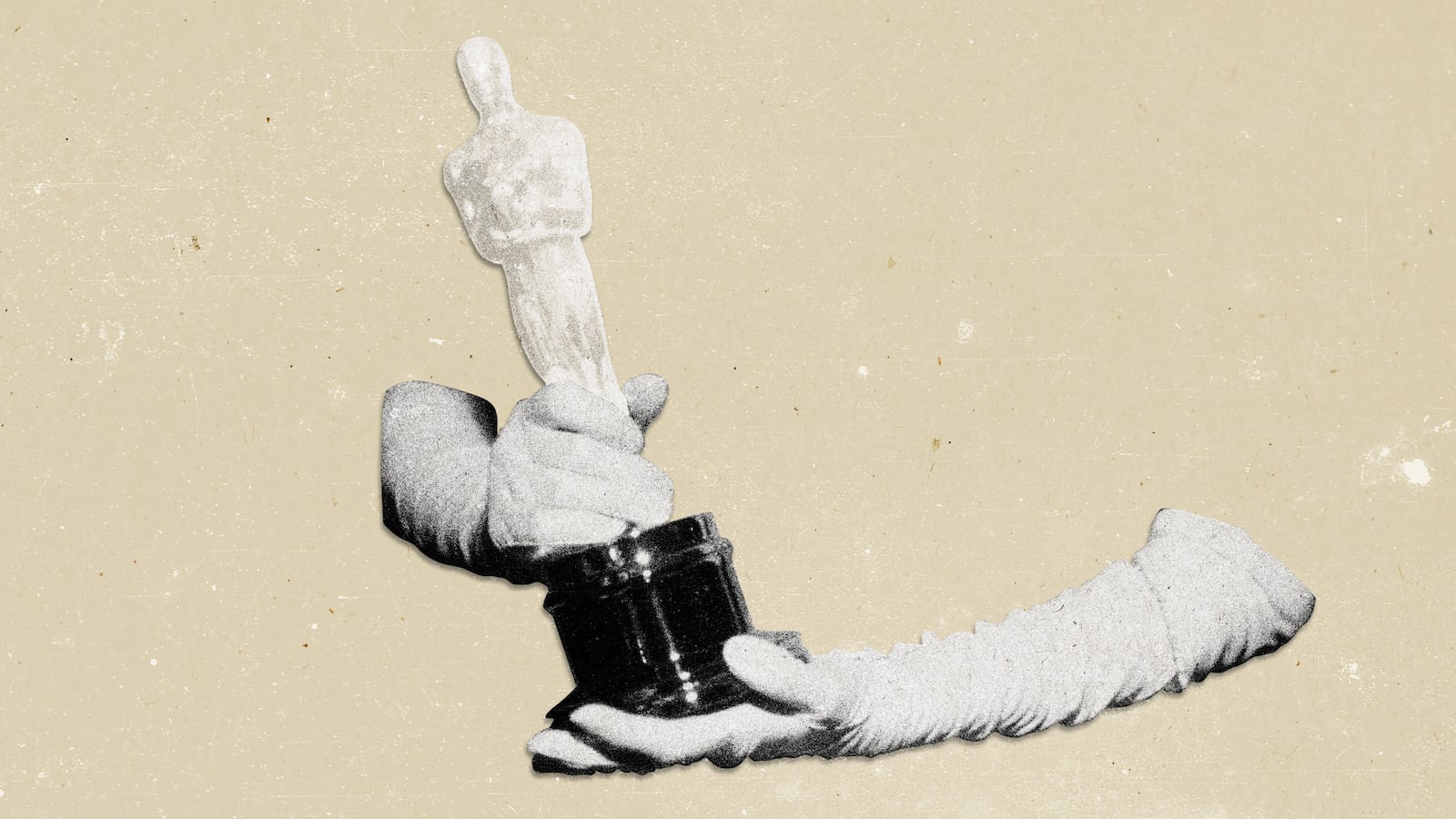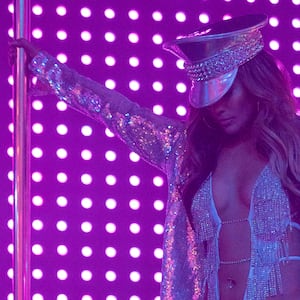Kevin: With Sunday night’s Oscars telecast just a few days away, there’s a strange feeling in the air... which is barely a feeling at all. Maybe because the season’s been so short, maybe because there’s no host to look forward to, or maybe because it’s the same movie and performances that have basically won everything—with 1917, Renée Zellweger, Joaquin Phoenix, Laura Dern, and Brad Pitt constantly at the microphone, the shows are basically indistinguishable this year—there seems to be less excitement for this year’s Academy Awards than usual.
Marlow: I’ve had to remind several friends that the Oscars are indeed this Sunday. Between the complete and utter lack of buzz, and the fact that no major box office hits are up for a bevy of awards, this thing is going to have the lowest ratings ever.
Kevin: It’s not for lack of controversy. There have certainly been those, though maybe the news cycle moves so fast now that they make less of an impact. Still, I can’t imagine anyone watching the awards Sunday night without having what may be the biggest controversy of the season on their mind, one that we’ve mentioned many times already on The Daily Beast, but which still bears repeating: the egregious lack of racial and gender diversity. Only one performer of color nominated in the acting categories—Harriet’s Cynthia Erivo—and, yet again, no woman in Best Director and only one film from a female director in Best Picture when this has been such a banner year for female-directed films. The outrage happens every year, but why is there no change? I hope we get a major shaming moment, like Natalie Portman calling out the all-male directing lineup at the Globes, or Joaquin Phoenix's BAFTA speech on systemic racism, on Sunday night.
Marlow: Well, you know that moment isn’t coming from Scarlett Johansson should she pull an upset in Best Actress. Perhaps one of the presenters, like Jane Fonda or Regina King? Or maybe Laura Dern? Or Joaquin, who once called the Oscars “total, utter bullshit?” Either way, you’re right: The lack of diversity at the Oscars this year is outrageous. Parasite is up for six Oscars, including Best Director and Best Picture. Does the Academy think it acted itself? They seem to view Asian actors as nameless, faceless workers versus the movie-shaping stars that they are. That could also explain the lack of consideration toward The Farewell. There have only been two Asian acting nominees in the last 35 years, and only seven all-time. An Asian has never been nominated in Best Actor, and only one Eurasian person (Merle Oberon, for 1935’s The Dark Angel) has ever been nommed in Best Actress. Given the sheer amount of outstanding cinema emanating from Asia, it’s a disgrace. In recent years, the Academy has taken measures to diversify its ranks, but things don’t seem to be changing nearly fast enough.
Kevin: It’s the most pressing issue facing not just the Academy, but the industry and, in turn, culture-at-large. It seems silly to discuss any of the other controversies of the year, as any of them are dwarfed by this issue.
Marlow: I still find Scarlett Johansson’s full-throated defense of Woody Allen very, very troubling!
Kevin: She’s truly the Icon of the Problematic Soundbite. There’s the fact that three of the Academy’s branches continue to make baffling decisions in selecting its nominees, inciting calls for reform in each of them: the Documentary Branch, which passed on the revolutionary editing achievements of Apollo 11 a year after controversially overlooking Won’t You Be My Neighbor?; the Animation Branch, which slighted juggernaut Frozen 2, almost as shocking as when it did the same to The LEGO Movie; and the Music Branch, which has curated one baffling, disastrous list of contenders year after year, continuing the trend by rebuffing both Beyoncé and Mary Steenburgen, whose original song for Wild Rose was magnificent.
Marlow: Really, what were they thinking? I can’t so much as hum along to any of the nominated songs this year, they’re so unmemorable. That being said, they should somehow find a way to shoehorn in an Adam Driver rendition of “Being Alive” into the ceremony, because who knows what will happen. And I get that they wanted (producers) the Obamas at the Oscars, but American Factory? Over the likes of Knock Down the House, Apollo 11 and Amazing Grace? Best Doc is a nightmare this year. I hope it at least goes to Honeyland, far and away the best documentary of the year and a staggering achievement, though it’ll probably go to Team Obama.
Kevin: You could also bring up murmurings of backlash to just about every Best Picture nominee. Did Jojo Rabbit earn its satire and comedic bent? Were male voters wrong to not be interested in Little Women? Is Marriage Story sexistly skewed in Adam Driver’s favor? Is 1917 too sentimental and contrived? Did the mediocre CGI de-aging ruin The Irishman? Is the revisionist-history climax to Once Upon a Time...in Hollywood offensive? Should Parasite, an international feature, take home an American Best Picture prize when it has its own foreign language category? Does anyone truly care about Ford v Ferrari? Literally everything about Joker. I have a million thoughts about each of these questions, but wonder if any of these micro-controversies have bubbled up in any way that could affect voting, as with Green Book last year.
Marlow: I think that, due to the incredibly compressed Oscar season, they haven’t. There’s been some chirping in the media about how much money Netflix threw around this Oscar season (estimated to be between $70-100 million) to score the most Oscar nominations (24) of any studio. But do people really care? I wrote a bit about the problems surrounding Once Upon a Time…in Hollywood—namely, its treatment of women, the inclusion of Emile Hirsch (who brutally attacked a female film exec at a Sundance party), and Quentin Tarantino and Brad Pitt’s complicity in Harvey Weinstein’s reign of terror—but Hollywood loves patting itself on the back and not reckoning with its dark past. And yes, I believe Marriage Story is skewed in Adam Driver’s character’s favor—he had an ongoing affair with his stage manager, which they downplay in the film by showing her relentlessly pursuing a disinterested Driver and even qualify by having Scarlett’s character hack into his email to learn of it—and feel terrible for Jennifer Jason Leigh, but still found it to be a beautiful film.
Kevin: “You shouldn’t be upset that I fucked her, you should be upset that I had a laugh with her!” is an all-time great brilliant/horrible/perfect/embarrassing line.
Marlow: Hilarious. And how about arguably the top film-awards publicist, Peggy Siegal, being blacklisted over her sketchy ties to Jeffrey Epstein (namely, that she had him attend many of her Oscar-season parties even after his pedophilia conviction)? And comparing her treatment to that of a Holocaust victim? Truly wild stuff. But you’re right: None of these micro-controversies has risen to the level of a Green Book, wherein members of Dr. Shirley’s surviving family came out against the film, or Bohemian Rhapsody, which grossly retconned Freddie Mercury’s AIDS diagnosis to suit its narrative. I still can’t believe that Driving Miss Daisy-adjacent saccharine piece of shit Green Book won Best Picture, or that Rami Malek won Best Actor for mouthing along to Queen songs.
Kevin: That’s the one thing this year’s ceremony, at the very least, has going for it. Sure, the eventual winners have been foretold for months now and that’s a snooze. But at the very least none of them are Green Book.









